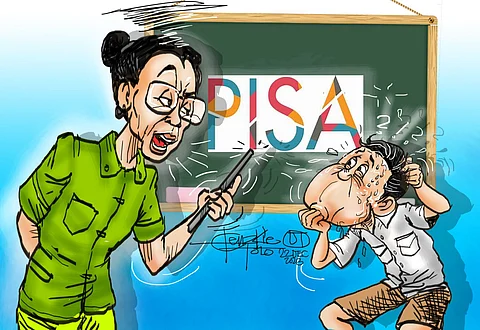
- NEWS
- the EDIT
- COMMENTARY
- BUSINESS
- LIFE
- SHOW
- ACTION
- GLOBAL GOALS
- SNAPS
- DYARYO TIRADA
- MORE

In the ever-competitive world of education, the recent release of the 2022 PISA test results has sent shockwaves through the global academic community. Alas, the spotlight now falls upon the Philippines, where the results reveal that a significant portion of 15-year-olds cannot even count beyond the number 20 and struggle to comprehend what they read.
The findings suggest a concerning struggle among this demographic, particularly in the domains of basic numeracy, as they cannot count beyond the number 20, and in reading comprehension, understanding the text poses a significant challenge.
The revelation raises questions about the foundational aspects of mathematics education. Mathematics is a cornerstone of intellectual development and problem-solving skills, providing a framework for logical thinking.
A deficiency in basic numeracy not only hampers academic progress but also impacts practical aspects of daily life. Whether managing finances, understanding data, or making informed decisions, a solid numerical foundation is indispensable.
The question arises: How did we reach a point where a significant segment of Filipino students struggle with basic arithmetic? Is it a failure of the education system, a lack of resources, or a broader societal issue that needs addressing?
Instead of attributing blame, let us consider this a call to action. The PISA results should catalyze a comprehensive examination of the curriculum, teaching methods, and support systems in place for students in the Philippines.
One possible explanation for this numeracy challenge could be focusing on rote memorization over conceptual understanding. Memorizing the sequence of numbers up to 20 does not necessarily signify an understanding of the underlying mathematical principles. A shift toward interactive and practical teaching methods, encouraging students to apply mathematical concepts in real-life scenarios, might foster a more profound comprehension of numbers and their relationships.
Turning our attention to reading comprehension, the PISA results indicate a struggle among Filipino 15-year-olds to understand written texts. This poses a grave concern as proficient reading skills are fundamental to academic success and future career prospects. Reading is not merely a technical skill but a gateway to knowledge, critical thinking, and empathy, all essential for a well-rounded education.
Several factors could contribute to the reading comprehension challenges highlighted by the PISA results. Insufficient emphasis on literacy development, a lack of access to diverse reading materials, or limited exposure to various genres could all play a role. Additionally, the pervasive influence of digital media may be impacting traditional reading habits, demanding a reassessment of how literacy is approached in the modern age.
There must be a concerted effort from educators, policymakers, and the community to address these challenges. Investing in teacher training programs emphasizing innovative and student-centered studies can enhance the learning experience. Introducing diverse and culturally relevant reading materials in the curriculum can engage students and foster a love for reading.
Moreover, bridging the digital divide and leveraging technology as an educational tool can open up new avenues for learning. Interactive e-books, educational apps, and online resources can complement traditional teaching methods, providing a dynamic and engaging learning environment.
However, balancing these technological advancements with a mindful approach that does not compromise the development of fundamental skills is crucial.
Overall, the 2022 PISA test results for Filipino 15-year-olds should not be dismissed as a mere statistic but instead as a clarion call for introspection and action.
Addressing the numeracy and literacy challenges requires a multifaceted approach that involves educators, policymakers, parents, and the community working collaboratively.
By prioritizing a holistic and innovative education system, we can empower the next generation of Filipinos with the skills and knowledge necessary to navigate an ever-evolving global landscape.
